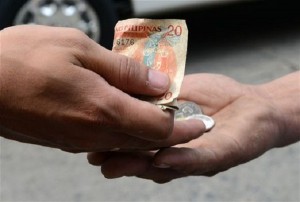MANILA, Philippines—Consumer prices are expected to remain stable in the coming months as lower food and fuel costs offset the effects of a weaker peso on imported goods.

Lower food and fuel costs offset the effects of a weaker peso on imported goods, Bangko Sentral ng Pilipinas says. AFP FILE PHOTO
Bangko Sentral ng Pilipinas (BSP) downplayed the effects of the peso, which is the worst-performing Asian currency so far this year, saying currencies in the region are all expected to depreciate amid the shifting sentiment of foreign investors.
“We are watching (the effects of the peso on inflation). But there are also countervailing factors,” BSP Governor Amando M. Tetangco Jr. said, citing lower prices of fuel in January.
He also noted that the price of food in global markets has remained unchanged.
“This is partly because the expected global recovery is only beginning. Therefore, the demand for commodities is just beginning to rise,” he told reporters on Wednesday. “At the same time, oil prices have remained more or less in the same range.”
Tetangco said that, despite the supply disruptions due to the onslaught of Super Typhoon Yolanda, lower commodity prices in January have helped counteract the effects of a weaker peso on consumers.
The peso fell to a multiyear low of 45.37:$1 last Monday—its lowest level since 2010—as investors dumped Asian assets and transferred their funds to more advanced economies like the United States.
A weaker peso makes imported consumer goods more expensive in peso terms.
According to Tetangco, monetary authorities have the leeway to combat volatility in financial markets, which may cause the peso to fluctuate sharply.
“The objective of the BSP is to give the exchange rate determination to the market, but we would be prepared to participate in foreign exchange trading if there is excessive volatility,” he said. “We want to minimize the excessive volatility. But the fundamental foreign exchange policy remains.”
Earlier this week, the central said it expected inflation to average between 3.4 and 4.3 percent in January, after reaching 4.1 percent the month before.
In a commentary this week, First Metro Investments Corp. (FMIC) echoed the BSP’s forecast, adding that it sees consumer prices rising by no more than 4 percent in the first quarter of the year.
Inflation is also expected to ease in the three succeeding quarters.
In 2013, inflation averaged at 3 percent, or at the low end of the central bank’s target range of 3 to 5 percent.
This year, average inflation is expected to reach 4.5 percent, which is still within the same target range.